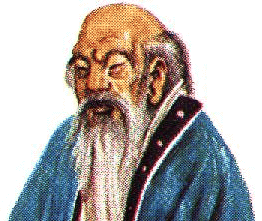

Lao-tzi

|
|
|
|
No one knows the exact dates or places when the concept of the Taoist Philosophy started. The collation of the Taoist principles and formulation into a ledgable philosophy for study and practice was attributed to Huang Ti - The Yellow Lord (2697-2597 BC). Huang Ti reigned as the third of the first five Chinese Rulers in what is called, 'The Legendary Period' (2852-2205 BC). His personal name was Yu-hsiung and his family name Chi, so his correct name (pronounced with family name first) was Chi, Yu-hsiung. His mother was Fu Pao. Huang Ti was also said to be responsible for research into medical matters. If you read 'The Yellow Emporer's Classic of Internal Medicine' (Translation by Ilza Veith) you will see that he also had five advisors; three female and two male. Before that no one is sure. Huang Ti sent his helpers far and wide to gather information about Taoist beliefs and practices, then scatterd and usually incoherant due to the lacking in peasant's knowledge. Lao-tzu (c.604-531 B.C.) Generally speaking, Taoism accepts all that happens within the Universe as being natural phenomena. As day and night exist side-by-side, so too, for example, good and evil must exist. Taoism does not attempt to dictate. |

Copyright (c) 2005+ T'ien Ti Tao Academy. All rights reserved.






 Tao and its origins
Tao and its origins